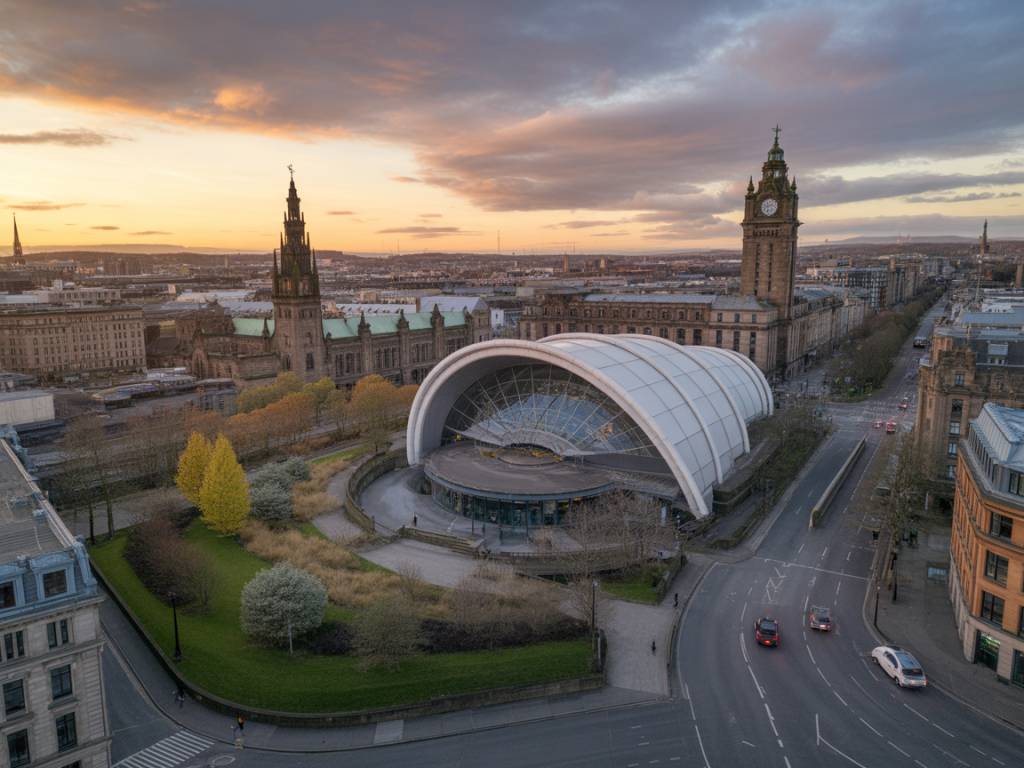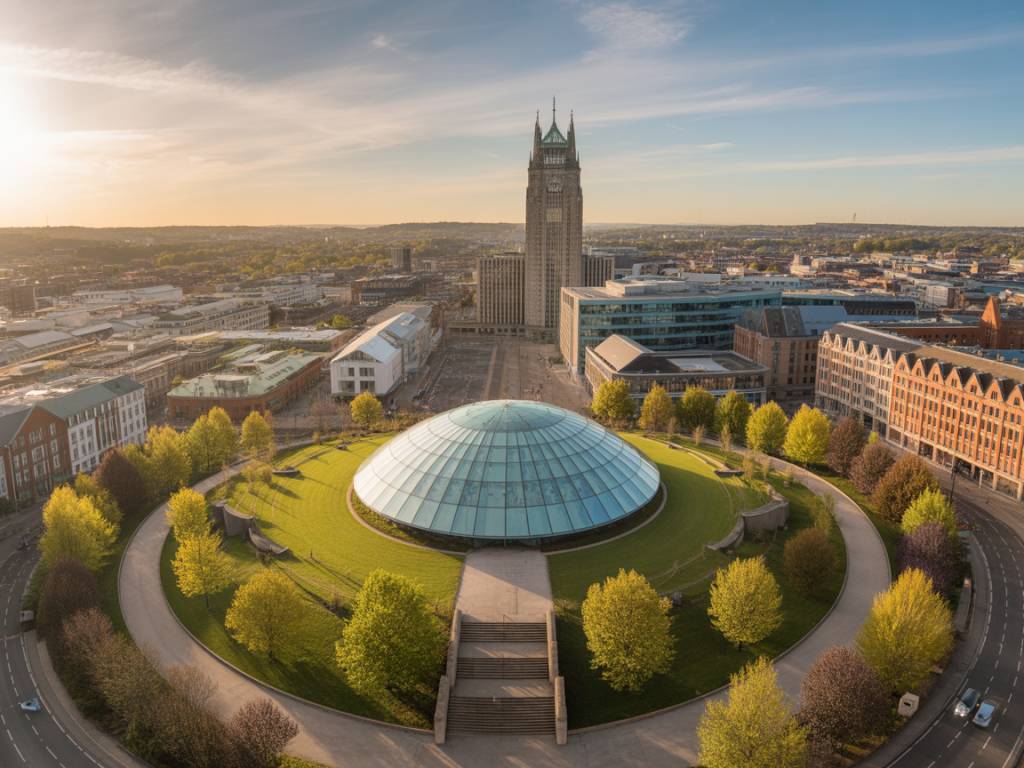Glasgow’s Transition Towards a Circular Economy
In recent years, Glasgow has emerged as one of the leading cities in the United Kingdom at the forefront of the circular economy transition. As the global urgency around sustainable development continues to accelerate, municipalities across Europe are reevaluating their linear economic models. Glasgow, historically recognized for its industrial roots, now stands out for its ambitious shift towards a system that minimizes waste, promotes resource efficiency, and fosters long-term economic resilience.
The circular economy redefines traditional models of consumption and production by focusing on reuse, repair, refurbishment, and recycling of materials and products. Rather than follow the “take, make, dispose” model, the circular economy aims to « close the loop » and keep materials in use for as long as possible. Glasgow’s growing commitment to this model represents a significant cultural, political, and economic shift, illustrating how cities can drive sustainable growth while stimulating innovation and job creation.
Strategic Vision and Local Policy Framework
One of the major drivers of Glasgow’s transformation is its strategic policy framework. The Glasgow Circular Economy Route Map, launched by Glasgow City Council and Zero Waste Scotland, forms the backbone of this transformation. It outlines key actions required to enable businesses, communities, and local government to collaborate effectively toward a circular future.
The Route Map is aligned with Glasgow’s broader ambition to become a carbon-neutral city by 2030. Through this framework, the city encourages sustainable procurement practices, investment in repair and reuse infrastructure, and the development of locally-oriented circular business models. Moreover, it places a strong emphasis on inclusive growth, aiming to ensure that the transition to a circular economy benefits all citizens, addressing both economic inequality and environmental justice.
Business Innovation and Industry Engagement
Circular economy initiatives have rapidly gained traction among local businesses and startups. Glasgow has become a magnet for circular economy startups and entrepreneurs experimenting with innovative models across construction, fashion, food waste, and technology.
Organizations like Circular Glasgow—a Chamber of Commerce-led initiative—play a central role in supporting businesses to adopt circular practices. By providing tailored guidance, knowledge-sharing platforms, and mentorship, Circular Glasgow facilitates meaningful change within the local business community. Notably, its Circular Economy Business Network encourages peer learning and collaboration among diverse sectors.
Key examples of Glasgow-based businesses leading the way in circularity include:
- Revive Eco – A startup that recycles coffee grounds into sustainable oils for use in cosmetics and food production.
- OptiMe – A digital platform helping companies track and reduce their environmental impact by adopting circular principles.
- Whisky Frames – A family-run business that upcycles discarded whisky barrels into photo frames and home décor items.
These businesses are not only reducing waste and carbon emissions but also serving as role models, showcasing how climate-resilient business models can also be economically competitive.
Circular Economy in Construction and the Built Environment
Construction is traditionally one of the most resource-intensive sectors globally. Glasgow is confronting this challenge head-on through a range of pilot projects and collaborative schemes aimed at reducing material waste and promoting circular construction methods. The city is home to several testbeds for circular building practices, facilitated by partnerships between the local government, universities, and private contractors.
Notably, the Construction Scotland Innovation Centre (CSIC) based near Glasgow is driving research and development in low-carbon and circular construction materials. Efforts include promoting the reuse of reclaimed building materials, implementation of modular building systems, and tools that allow digital tracking of material flows in construction projects.
These initiatives are not just environmentally beneficial—many also promise cost savings for developers and long-term economic benefits for the city. By embedding circular design principles early in the planning and construction process, Glasgow is pioneering solutions that other cities could replicate at scale.
Academic and Community Engagement
Glasgow’s universities play an important role in advancing the circular economy through education, research, and community partnerships. The University of Strathclyde and the University of Glasgow both support multi-disciplinary research into sustainability and circular innovation. Courses and programs focused on circular economy concepts are helping to develop the next generation of sustainability professionals.
At the community level, grassroots initiatives have flourished. Local repair cafés, tool libraries, and swap shops have become popular, reflecting growing public receptivity to circular living. Projects like Repair Café Glasgow offer residents a space to bring broken household items for repair by volunteers, reducing unnecessary waste while promoting intergenerational knowledge-sharing.
These community initiatives play a vital role not only in diverting material from landfill but also in building social cohesion. They highlight the importance of citizen engagement in ensuring a just and inclusive transition to a zero-waste society.
Investment and Economic Opportunities
Glasgow’s circular economy shift is not merely a sustainability initiative—it also represents a long-term economic development strategy. According to research by Zero Waste Scotland, embracing a circular economy could generate thousands of new jobs across the country, and Glasgow is well-positioned to capture its share of these opportunities.
Investment in remanufacturing facilities, recycling infrastructure, and circular technology platforms is growing. The city is also beginning to draw international funding and interest as a result of its leadership in sustainable innovation. The green jobs created through circular industries—ranging from software development to logistics, materials science to skilled trades—are integral to Glasgow’s broader economic resilience strategy.
FinTech and GreenTech startups are increasingly looking to Glasgow as a hub of innovation, bolstered by a strong support ecosystem including accelerators, incubators, and business networks. Initiatives like the Green Investment Portfolio for Glasgow City Region are designed to attract further private capital into circular ventures, accelerating the city’s green transformation.
Challenges and Future Outlook
Despite the progress, challenges remain. The transition to a circular economy requires significant cultural and behavioral change, both at the consumer and corporate level. Infrastructure gaps, particularly in waste collection and material sorting, still present barriers to full circularity. Moreover, aligning incentives across public, private, and civic sectors remains a complex endeavor.
However, Glasgow’s momentum is undeniable. As one of the host cities of COP26 in 2021, the city has already demonstrated a high-level commitment to combating climate change. This global spotlight has further galvanized political will and mobilized new partnerships to mainstream circularity.
Going forward, Glasgow’s experience offers valuable insights for other UK and European cities seeking to make the leap toward a circular economy. Its holistic approach—anchored in policy, supported by business innovation, enriched by academic research, and driven by grassroots action—sets a compelling precedent for urban sustainability in the 21st century.




